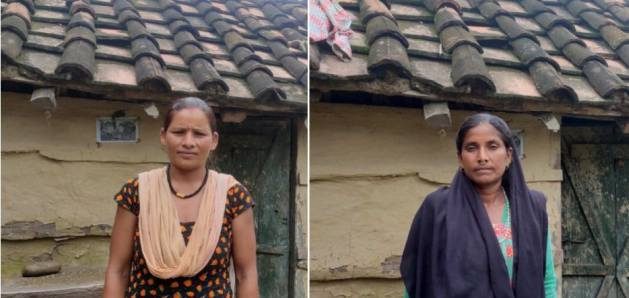COVID-19 Sharpens Caste Discrimination in Nepal

KAILALI, Nepal, Aug 14 (IPS) - Across Nepal, it is the already under-served and vulnerable who have been affected by the prolonged lockdowns. But it is the Dalit returnees from India who have tested positive and their families who face double discrimination.
The Ministry of Health issues a daily tally of COVID-19 cases, but no one is counting the poorest of the poor who are dying of hunger or pre-existing diseases, or have been have been driven deeper into destitution.
Kalpana Nagari, 30, works as a day labourer by the roadside in Godavari Municipality to earn enough to feed her two children. This time of year there are plenty of jobs planting or weeding paddy fields, but she is unemployed because of social stigma after her husband, Tika Narayan, tested positive for COVID-19 last month.
Tika Narayan Nagari had returned from India after he lost his job there on 15 May. He tested positive was quarantined altogether for 50 days first at the border, and later because of delays in getting his test result. But even after he got out, the Dalit family has been shunned by neighbours and society.
Her family used to face discrimination even before because they were Dalit, but COVID-19 has added another layer of prejudice. Even that is not what worries Kalpana the most – it is not earning enough to feed her family.
"Without work, how are we going to feed our children that is what I am most anxious about," says Kalpana, who does not have a house of her own and lives with her sister-in-law. Her husband had to go to India to find work to repay a loan he took for his mother's funeral.
"During every meal, I worry about where the next one will come from, and I feel faint," says Kalpana. "The landlords did not give me any work in the rice fields because they said ‘your husband has corona, you might also be infected'.'"
Kalawati Auji, 40, is also from Godavari and raised her three sons all by herself after her husband died nine years ago. Her eldest son died last year, and her youngest has heart disease. Her middle child, Dipak is 22 and worked in Bareilly in India. It was the money Dipak sent home that allowed Kalawati to pay for food and medicines for her daughter-in-law, son and grandson.
But Dipak lost his job and returned to Nepal on 30 June. He tested positive for COVID-19 and was confined in a quarantine for 34 days where he was ostracised both for being infected, and for being a Dalit. After coming home, he quarantined himself in a cowshed for a week.
But even after he recovered, the family has been harassed and humiliated by neighbours. Neither Dipak not Kalwati can find a job, and they owe a neighbourhood provision store Rs50,000.
Says Kalawati: "This pandemic has come to kill the poor like us."
Fifty-year-old Harish B K also returned from Bareilly in the first week of May. Among the 234 people whose swab samples were taken, Harish was among 70 who tested positive – only two of them were non-Dalits.
"The non-Dalits in the quarantine used to get hot water, lunch, and more food than us. If we asked for more food, they would ignore us," he recalls. Now out of quarantine, but jobless, deep in debt, and facing double discrimination and humiliation, Harish says he often has suicidal thoughts.
Godavari Municipality says it has plans to provide farm subsidies to the most vulnerable during the pandemic and lockdown. Deputy Mayor Ratna Kadayat says the plan will give priority to Dalits, women, and marginalised communities under the ‘Prime Minister's Employment Program'.
But these future plans are a mirage for most Dalit families like the Nagaris, Aujis and BKs here. Their needs are urgent and immediate, and they have heard these promises before.
Rights activist Savitra Ghimire at the Dalit Women's Rights Forum (DWRF) says the relief may be too little too late for most Dalit families. Godavari and the Attaria highway intersection are hotspots for a surge in coronavirus cases. In the past month alone, the area got 4,000 returnees from India, and of them 349 tested positive and 294 have recovered and gone home.
However, being virus-free is just the beginning of the struggle for Dalit families here in western Nepal. As more and more districts re-impose lockdown, business is not expected to pick up soon, and this means fewer options for employment. And even if jobs open up, Dalit returnees and their families here will be the last to get them.
This story was originally published by The Nepali Times
© Inter Press Service (2020) — All Rights Reserved. Original source: Inter Press Service
 Global Issues
Global Issues